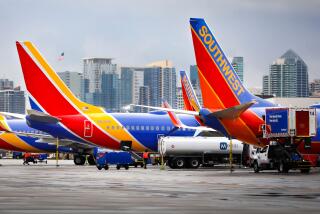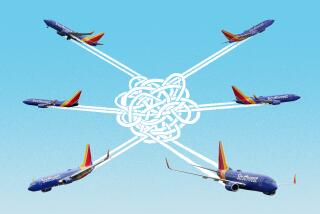U.S. Conducts ‘Fitness’ Exam of Northwest Airlines; Debt Cited
- Share via
NEW YORK — The Transportation Department, concerned about the heavy load of debt taken on by Northwest Airlines in its recent buyout by Los Angeles investor Alfred A. Checchi, said Thursday that it is conducting a full-scale “fitness examination” of the airline with particular emphasis on safety.
Jeffrey N. Shane, assistant secretary for policy and international affairs, said in an interview that the department would closely scrutinize both debt burdens and foreign investment in the U.S. airline industry.
“Our reason for looking at the debt is safety,” Shane said. “We are not trying to make moral judgments.”
He indicated that if an airline is too burdened with debt, the resulting need to make high interest payments might cause it to skimp on such things as maintenance and other safety considerations.
Checchi would not comment Thursday. The former Marriott Corp. treasurer led a group that acquired Northwest in June for $4.05 billion, with about $3.3 billion of it borrowed. Checchi’s partners in the transaction were KLM Royal Dutch Airlines and a unit of Elders IXL, the Australian brewer.
Reacting to reports of the possible tightening of government restraints on leveraged buyouts, which often result in greatly increased corporate debt loads, and on foreign investment in U.S. airlines, airline stocks--which had risen dramatically in recent weeks--tumbled Thursday.
The Dow Jones transportation index closed at 1,509.42, down 20.10 points. Stock in AMR Corp., parent of American Airlines, closed down $5 at $88; UAL Corp., parent of United Airlines, was off 25 cents at $279.25, and Delta Air Lines Inc. dropped $4.125 to close at $79.875--all on the New York Stock Exchange.
Noting that “the cash-flow picture of an airline suddenly changes dramatically” when it takes on large amounts of new debt, Shane said, “The U.S. government, as part of its ongoing oversight at that airline (Northwest) and other airlines, has to have the information to know whether there will be a problem in the future. . . . It must know well in advance that such a problem will materialize.”
He said the result of the study of Northwest could simply be “saying it looks OK to us--and in that case we do nothing.” Or, he added, regulators could say “that we are a little concerned as to what would happen in . . . (an economic) downturn” with such a high interest load. In that event, the department could impose on the carrier “periodic reporting requirements.”
The “ultimate sanction,” Shane said, though making clear that such action is “not likely,” could be lifting the operating license of the carrier, which is based in Eagan, Minn.
“If by some stretch of the imagination the (Checchi) transaction is so wild that we felt that the airline would not be quote ‘fit’ within the meaning of the Federal Aviation Act, we could probably issue an order (requiring the airline) to show cause why we should not withdraw the certificate.”
Shane said the department’s investigation of Northwest, which has been going on for a number of weeks, is expected to be completed within the next two weeks. He said the well-known accounting firm of Coopers & Lybrand has been hired to work with department analysts in doing the study.
Airline analysts had varying opinions as to the meaning of Shane’s warnings.
“This is simply jawboning,” said Edmund S. Greenslet, editor of the Florida-based Airline Monitor. “It is a typical government tactic: You talk to the people you want to influence. You persuade them how you want something done without bringing the full weight of the government down on them. You tell them there are fences, but you don’t tell them how high the fences will be. The government doesn’t say if it will or if it won’t rule adversely.”
Robert Decker, an airline analyst with the Chicago-based investment firm of Duff & Phelps, said: “We have had airlines with too much debt for a long time and we have not done anything. Why is an airline unfit to operate if it has too much debt? If it is skimping (on maintenance), the FAA has standards for that.”
Shane’s comments could have implications for UAL, which is said to be considering a management-led buyout in partnership with British Airways. According to a report in Thursday’s London Evening Standard, British Airways stands ready to commit $1 billion to acquire 25% of UAL, as part of a buyout plan said to include United’s unions.
Has Deal With British
UAL’s board is scheduled to meet in New York today to review its options, according to a source close to the situation. Besides the British Airways plan, UAL has received a $275-a-share offer from Los Angeles billionaire Marvin Davis.
UAL already has a marketing agreement with British Airways, in which the British carrier directs its U.S.-bound passengers to United, and United feeds its Europe-bound passengers to British Airways. One airline executive said Shane’s comments suggest that British Airways might have to take only a passive role in UAL management if it continues its marketing arrangement with United.
Shane said he believes that the government should not interfere in the affairs of the airline industry unless it becomes absolutely necessary. But he said the expected wave of airline leveraged buyouts will have far-reaching implications for shareholders, creditors, employees and the traveling public.
“It is not appropriate for the U.S. government to go jump into the marketplace to regulate such transactions,” Shane said. “We want the marketplace to tell us what the airline industry ought to look like. . . . Nobody can second-guess the marketplace. However, we have a very important responsibility to the public to make sure that it continues to be safe.”
Shane said the government was taking a “long, hard look” at the Northwest transaction because “it is a harbinger” of others yet to come.
“It is a watershed transaction,” he said. “It is a major takeover involving a very high level of debt with a very big chunk of foreign-owned stock. I don’t think we have seen a transaction that has all of these ingredients (but) there seems to be a trend in that direction.”
Concerning levels of foreign investment in U.S. airlines, Shane said regulators have no flexibility because federal law says that no U.S. air carrier may have more than 25% foreign ownership and that no more than a third of the members of a carrier’s board of directors can be non-U.S. citizens. “We would not have the option, the flexibility in such cases.”
Aside from such numerical requirements, he said, there also cannot be what he termed “foreign control” of a U.S. carrier. This requires more subtle judgments, he said, and could involve things such as marketing agreements between a U.S. and a foreign airline that put an “ironclad obligation” on the domestic carrier.
In such a case, he said, “They could lose their license.”
Times staff writer Denise Gellene in Los Angeles contributed to this story.
* UNITED BID: Page 4
More to Read
Inside the business of entertainment
The Wide Shot brings you news, analysis and insights on everything from streaming wars to production — and what it all means for the future.
You may occasionally receive promotional content from the Los Angeles Times.










